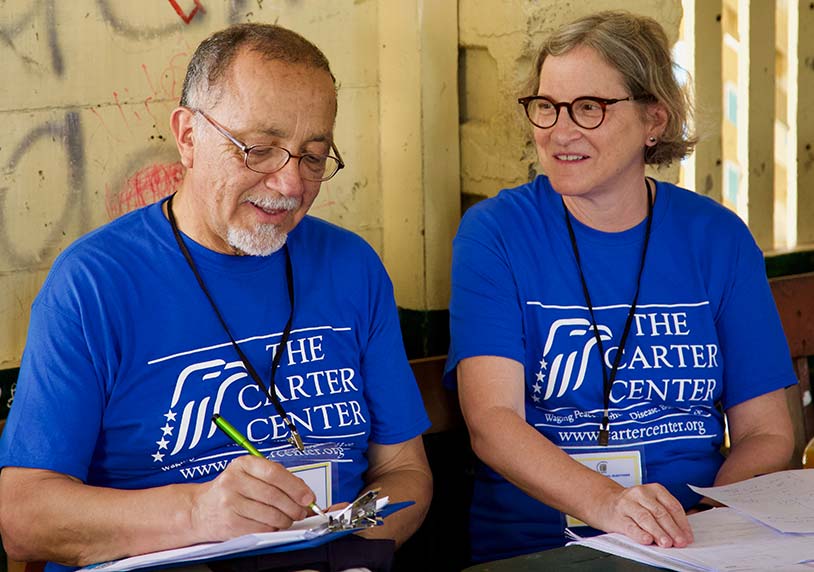Montana Election Observation Initiative
Visit the websiteTrust in electoral institutions in the U.S. is declining. Given recent attempts to discredit the electoral process, The Carter Center believes that our democratic process and elections need champions now more than ever. Our goal is to build a nonpartisan movement of citizen observers who are excited about democracy and want to do their part to promote transparent, accurate, secure, and accessible elections.
Nonpartisan election observation is an impartial process where trained observers systematically gather data about an election to assess key aspects of the process and report on the degree to which the election was fair, peaceful, and credible. They learn about relevant national, state, and local election laws, safeguards, and procedures and provide an on-the-ground assessment of the extent to which these procedures were consistently and correctly applied. Grounded by facts and evidence, trustworthy observers validate the critical work being done by those on the front lines of our democracy.
Nonpartisan observers are citizens, neighbors, and fellow voters. Observers cannot be party actors or advocates. In fact, observers agree to follow a strict code of conduct to ensure they remain nonpartisan, don’t interfere with the voting process, respect any mandatory accreditation procedures, and attend robust training on any electoral process that they undertake to observe.
Throughout the election calendar, teams of observers are stationed at polling places, election offices, and other satellite locations where election operations take place. Each team collects data using a standardized set of questions about the election process. They also record general observations and anything noteworthy they see. That data is then collated, analyzed, and summarized in periodic reports that are released to the public. Read our past reports on U.S. elections »
Unlike partisan observers — also called “challengers” or “poll watchers” — who generally look for activity that could undermine their own party’s or candidate’s interests, nonpartisan observers have no stake in the election outcome. They do not get involved or interfere in election processes, even if they see something that should not happen. They are trained to understand the election process as specified by law and to impartially report on whether election procedures are correctly followed.
Receive updates on our nonpartisan observation work in the United States.
Sign up hereThe chart below offers a look at some of the key similarities and differences between the work of nonpartisan, partisan, and election protection observers.
| Nonpartisan Observation | Partisan Observation | Election Protection | |
|---|---|---|---|
| Demonstrates the community’s interest and support for elections that are credible, transparent, accessible to all voters, and that represent a true democratic process | |||
| Reinforces the efforts of civil society and voting rights groups in the electoral process and increases the credibility of their work | |||
| Protects, advances, and defends the right to vote | |||
| Works to ensure the right of access the ballot | |||
| Systematically collects data and publicly reports on adherence to election law during absentee voting, in-person voting, and vote tabulation | |||
| Provides an impartial assessment of the electoral process – analyzing its strengths and weaknesses | |||
| Provides a partial assessment of the electoral process | |||
| Provides public recommendations on ways to improve the election process | |||
| Places observers inside polling locations | |||
| Monitors outside polling locations and has internal reporting systems for incidences of voter suppression | |||
| Follows a strict code of conduct holding observers accountable | |||
| Uses observation findings to advance the candidate, party, or ballot initiative interests | |||
| Intervenes at the polls and calls state election management offices when there are clear breaches in electoral law or voters are being prevented from accessing the ballot |
For the 2024 election cycle, The Carter Center supported nonpartisan coalitions of citizens from across the political spectrum in Montana and New Mexico to observe and report on the conduct of the election in each state. The Center’s U.S. Elections team also deployed a group of nonpartisan observers to observe the election process in Fulton County, Georgia – working alongside the “Monitoring Team” as part of the Fulton County 2024 Election Observation Mission – and in multiple counties in Georgia for the risk-limiting audit, like in 2022 and 2020.

Montana Election Observation Initiative
Visit the websiteObserve New Mexico Elections
Visit the website
The Carter Center hopes to expand its support for nonpartisan coalitions in more U.S. states for the 2026 midterm election cycle. You can sign up to receive general updates on our nonpartisan observation work in the United States.
Please sign up below for important news about the work of The Carter Center and special event invitations.
